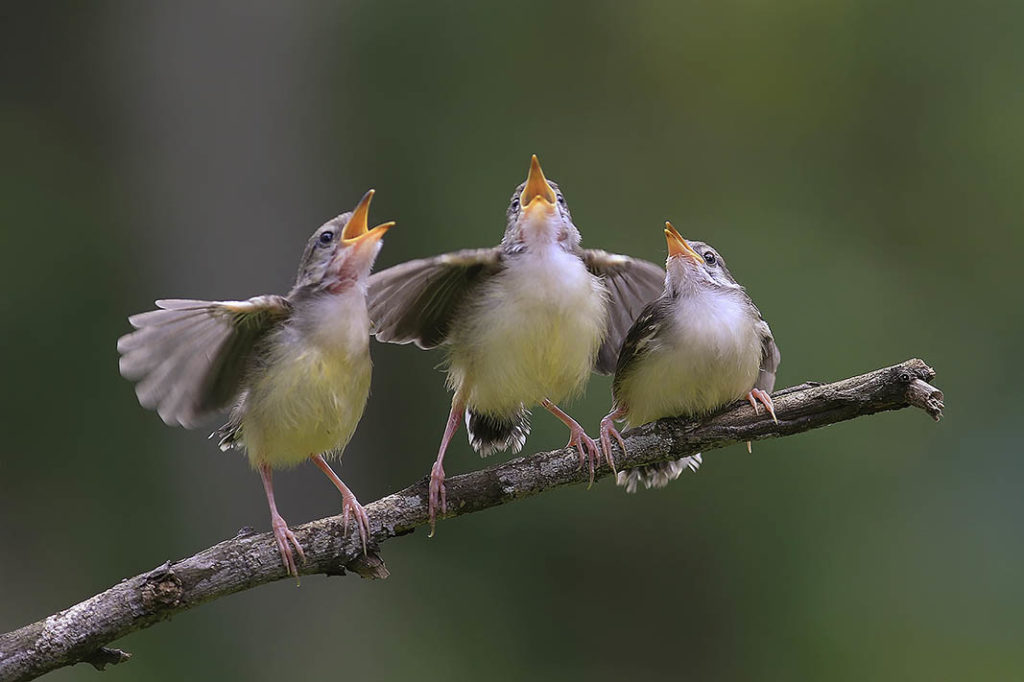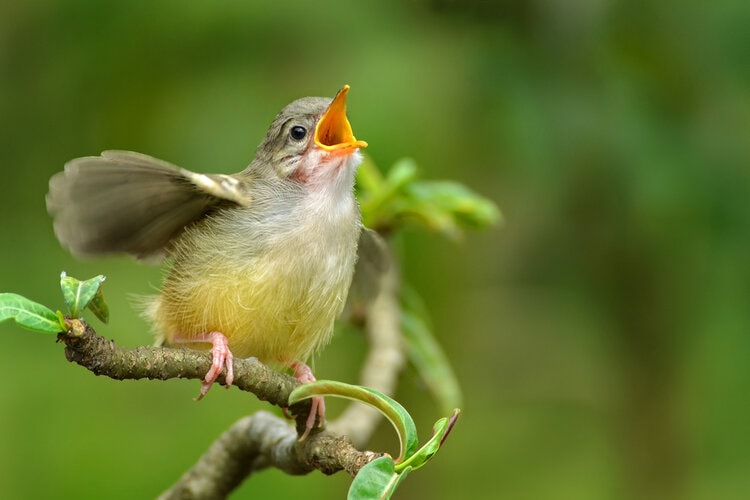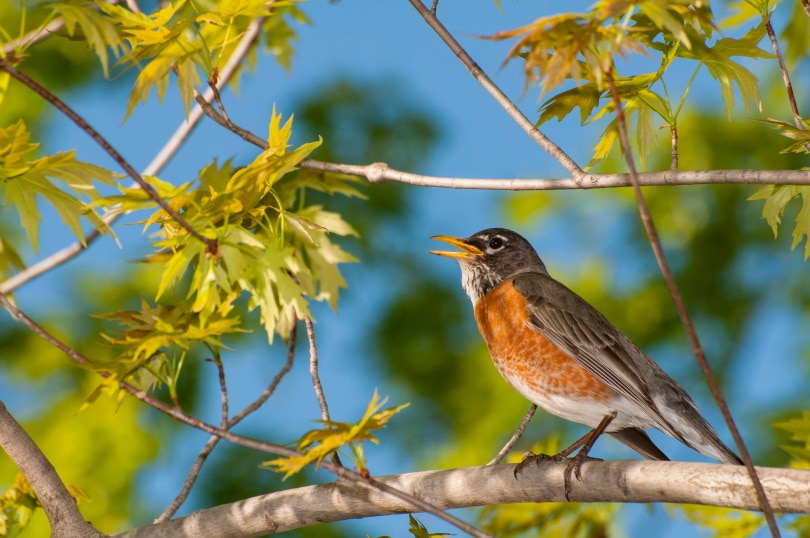Why Do Birds Sing In the Morning? 3 Typical Reasons
Last Updated on

Have you ever asked yourself why birds sing in the morning? The answer is quite simple. That’s how they communicate with others in the bird’s community.
From songbirds to crows, many different types of birds sing at some point during the morning. It’s a natural phenomenon that occurs daily at the same time. It also allows them to establish a position in the “roost.” Different studies have shown there are several other reasons, of course.
We have researched several sources and come up with interesting facts about why birds sing in the morning. Keep reading as we discuss more on this bird phenomenon!

What Do We Call the Songs Sung By Birds In the Morning?
The songs sung by birds in the morning are called the dawn choruses. The dawn chorus is a remarkable phenomenon. It’s one of the most spectacular and awe-inspiring sounds in nature.
Hundreds of different bird species sing back and forth from their roosts in trees, bushes, vines, and grasses.
The songs grow louder and louder as daylight increases. Then, they reach a crescendo before finally petering out as the temperature rises.

The 3 Reasons Birds Sing In the Morning
Everyone loves nature. Listening to birds sing in the morning can improve your happiness instantly—so says science. But why do birds sing? Is it only to attract a mate? Here, we will be looking at some of the reasons birds sing in the morning.
1. To Attract Mates
Male birds will often sing to locate females of their species. The females will sometimes reply with their songs. It helps them find each other so that they can mate.
Female birds are attracted to males with bright colors and more elaborate songs. They treat it as a sign of good genes and a better immune system.
Many females leave mating decisions until late in spring. That’s when they have sufficient information on which males have been singing for some time. Then, they choose their mates accordingly.
2. To Establish and Safeguard Their Territory
Birds use songs to communicate with other birds of the same species. They also use dawn choruses to claim their territory by letting others know where they are located.
This behavior is most common during the mating season when males attract females to their territory. The males want to establish themselves as the dominant species in the area. They keep other male birds away from them and their nests. The first bird to sing receives a territorial advantage over other birds.
3. To Safeguard Their Young Ones
One of the most common reasons birds sing in the morning is to safeguard their young ones in the nest. The songbirds have loud and distinct voices.
Their young ones are vulnerable to predators. A bird’s mother can be away from her young ones when she is out looking for food.
In her absence, it will be crucial for a male bird to step up and protect his family by singing loud enough that no predator enters the nest.

What Bird Species Sing In the Morning?
Do you often wake up in the early morning to the singing of birds? If you do, what species have you heard? Are they common birds or rare ones?
During the winter months, bird songs can be a rare occurrence for many people. But during the spring and summer, many birds sing.
Although female birds do sing sometimes, mostly the morning song is done by the male counterparts. The female birds usually use dawn choruses to warn of danger or find their young ones.
Here are several bird species that sing in the morning.
1. Robins

Robins are famous for their morning songs. They make some of the most beautiful morning music, not so complex, but they’re loud and pleasing to the ear. Females don’t join in the singing until later in the day.
Besides, the robin is the first bird to sing in the morning. That’s why it’s associated with the dawn. In the springtime, these birds are active at night as well. In many cases, they are competing with other males to attract a mate.
Usually, they sing because they have an established territory and want to defend it from intruders. They also sing to proclaim ownership of the territory.
2. Blackbirds

The male blackbird (Turdus merula) is one of the first birds to sing in the morning. It’s a highly territorial bird that holds its place all year round.
Blackbirds are native to Europe, but they were introduced to North America and Australia in the 19th century. They are easily identified by their glossy black feathers and bright yellow beak.
Their song is a melodious, warbling mixture of whistles, trills, and gurgles. Besides singing in the morning, the male blackbird also sings throughout the mating season. It does this to attract females and defend its territory.
3. Wrens

The wrens are found throughout most of the U.S. and Canada. They are among the earliest singers, with many species starting their songs before the sun rises.
The house wren (Troglodytes aedon) is one of the most common backyard singers in North America. They are small brown birds with short necks and long tails. They are vocal, singing from the top of a tree or tall shrub.
The male wren is more likely to sing in the early morning than the female. A wren’s song begins with one to four short and sharp introductory notes. Then, he repeats the same notes about seven times. Sometimes, the bird ends each repetition with a few long trills.
4. Sparrows

If you’ve ever been out birding at first light, there’s a good chance you have heard sparrows singing well before sunrise. Several species of sparrows start their morning song as much as an hour before sunrise. In fact, many of these birds do most of their singing early in the morning. That’s why they’re not usually heard by casual birders who are out later in the day.
They sing to defend their territory and find a mate. At this time, they also get to build a nest and lay eggs.
5. Woodpigeons

The woodpigeon is a large pigeon found throughout Britain and Ireland. Also, they have a distinctive white patch on their neck and a black tail. Their cooing song is a familiar sound in parks, gardens, farmland, and woodland edges.
Usually, they sing loudly at dawn and can produce one of the first bird songs heard on any given day. Their song is a low-pitched cooing sound that is quite loud and persistent. Each male woodpigeon tries to outdo other males in his territory.
6. Blue Tits

Blue tits are found in Europe living in deciduous woodland and gardens. They get their name from their bright blue caps, wings, and tails. The males are more vibrantly colored than females.
Blue tits sing a loud song that has two key parts. The first part is a mixture of high-pitched whistles and trills and the second part is a buzzy chattering sound.
Their song carries well through the air. They sing with enthusiasm, especially when they feel territorial! You will often find the bird perched on a garden fence or bird feeder.
They are known as early risers as they like to get up at dawn every day. If you hear their song, it’s a sign that spring has arrived. The male Blue Tit sings more than the female, who only sings when she has eggs.

What Time Do Birds Wake Up?
The time of day varies from species to species. But most birds wake up around 4 am or one hour before the sun rises. That is when they begin singing their dawn choruses. Also, they begin to hop around and fly from their nests.
Robins are known to start their day at first light. But many other bird species join in this early chorus. It’s partly because many birds are diurnal. It means they are active during the day and rest at night just like we humans do.
Also, food is more available in the morning as dew and frost melt away. The insects that birds love to eat are easier to find in the morning. The birds can track the insects’ movement more easily early in the morning.

Where Can You Hear Birds Singing?
You can hear the birds singing almost anywhere. But rural areas have far more birds singing compared to urban areas. There are various ways to explain this phenomenon. First, in the cities, you may not hear the birds singing as the sound of traffic drowns the sound of nature. Also, many people in cities are too busy to even notice or hear a bird song.
Additionally, birds in urban areas are exposed to more noise pollution than those living in rural areas. The background noise level is much higher in cities. It makes it challenging for birds to communicate through sound.
To add to that, there are more trees, flowers, and grass in the countryside than in cities. Birds are attracted by the green color and sing happily among the branches. They can enjoy a quiet and peaceful environment without any disturbance from human beings.

In Conclusion
Birds sing in the morning for various reasons, such as proclaiming their territories and attracting mates. Of course, we may not know what goes on in these creatures’ heads as they sing melodiously, but we sure enjoy their morning chanting.
Birds are the ultimate morning animals. Their morning songs can even wake us up and get ready for the day ahead. Of course, we don’t know what goes on inside a bird’s head. Their dawn choruses are soothing and pleasant sounds to set our day off on the right foot.
We should all look forward to hearing it every morning. Hopefully, that inspires you to appreciate the details of nature even more.
Featured Image Credit: TAUFIK ARDIANSYAH, Shutterstock
About the Author Robert Sparks
Robert’s obsession with all things optical started early in life, when his optician father would bring home prototypes for Robert to play with. Nowadays, Robert is dedicated to helping others find the right optics for their needs. His hobbies include astronomy, astrophysics, and model building. Originally from Newark, NJ, he resides in Santa Fe, New Mexico, where the nighttime skies are filled with glittering stars.
Related Articles:
10 Types of Hummingbirds in Arkansas (With Pictures)
8 Types of Hummingbirds in Nebraska (With Pictures)
5 Types of Hummingbirds in Idaho (With Pictures)
3 Types of Hummingbirds in Mississippi (With Pictures)
8 Types of Hummingbirds in Kansas (With Pictures)
5 Types of Hummingbirds in West Virginia (With Pictures)
5 Types of Hummingbirds in Ohio (With Pictures)
Where Do Nuthatches Nest? Nuthatch Nesting Habits Explained
